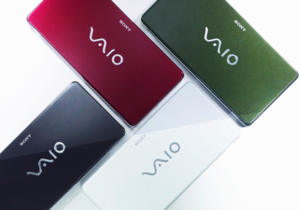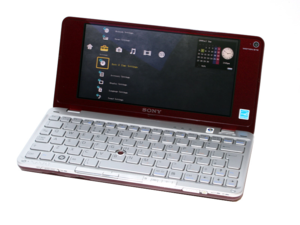VGN-P: Difference between revisions
More actions
No edit summary |
|||
| Line 4: | Line 4: | ||
The Sony VAIO VGN-P was a seriers of ultraportable subnotebook/ultra-mobile PC (UMPC) laptops released by Sony in early 2009. | The Sony VAIO VGN-P was a seriers of ultraportable subnotebook/ultra-mobile PC (UMPC) laptops released by Sony in early 2009. | ||
They were marketed as "lifestyle PCs", with big focus put on connectivity, thanks to the | They were marketed as "lifestyle PCs", with big focus put on connectivity, thanks to the integration on some models of GPS and wireless broadband 3G connectivity. All P-series came pre-installed with an XMB-like Linux desktop environment that allowed the user to "power on the laptop and go online and access multimedia files in less than 30 seconds". | ||
[[File:VGN-P in red.png|alt=VGN-P in red|thumb|VGN-P in red]] | [[File:VGN-P in red.png|alt=VGN-P in red|thumb|VGN-P in red]] | ||
Performance was underwhelming even back in the day. This makes the P-series today not much more than a fun novelty and a collectors' item. | |||
Prices for the tiny laptops were pretty steep, with base models hovering around 800USD and fully-loaded ones going for almost 1900USD MSRP. This has made them pretty rare and so very sought-after. Prices for used examples are usually around 200-250€, but it's possible to find some good deals with enough patience. | Prices for the tiny laptops were pretty steep, with base models hovering around 800USD and fully-loaded ones going for almost 1900USD MSRP. This has made them pretty rare and so very sought-after. Prices for used examples are usually around 200-250€, but it's possible to find some good deals with enough patience. | ||
Low end models did not include a camera, GPS or wireless broadband 3G connectivity and had less RAM, Storage and a worse CPU installed. They all have a 2100mAh battery, enough for a few hours of usage with the slow and efficient Intel Atom CPU. Most models had a HDD, though Sony released some with | Low end models did not include a camera, GPS or wireless broadband 3G connectivity and had less RAM, Storage and a worse CPU installed. They all have a 2100mAh battery (VGP-BPS15), enough for a few hours of usage with the slow and efficient Intel Atom CPU, and an optional extended battery (VGP-BPL15) was also available, providing double the capacity at 4200mAh, at the cost of being thicker and raising the P at an angle. Most models had a HDD, though Sony released some with a SSD for better performance and load up times, which were the same microSATA SSDs used in other VAIOs such as the [[VGN-AW]] and [[VGN-Z]]. | ||
== Detailed Specs == | == Detailed Specs == | ||
| Line 23: | Line 23: | ||
'''Display:''' 8" 1600x768 LED display | '''Display:''' 8" 1600x768 LED display | ||
'''Storage:''' 60-80GB HDD, SSD options available | '''Storage:''' 60-80GB HDD, 64GB/128GB/256GB SSD options available | ||
'''Weight:''' 1.3lbs (589g) | '''Weight:''' 1.3lbs (589g) | ||
Latest revision as of 20:09, 3 December 2024

Overview
The Sony VAIO VGN-P was a seriers of ultraportable subnotebook/ultra-mobile PC (UMPC) laptops released by Sony in early 2009.
They were marketed as "lifestyle PCs", with big focus put on connectivity, thanks to the integration on some models of GPS and wireless broadband 3G connectivity. All P-series came pre-installed with an XMB-like Linux desktop environment that allowed the user to "power on the laptop and go online and access multimedia files in less than 30 seconds".

Performance was underwhelming even back in the day. This makes the P-series today not much more than a fun novelty and a collectors' item.
Prices for the tiny laptops were pretty steep, with base models hovering around 800USD and fully-loaded ones going for almost 1900USD MSRP. This has made them pretty rare and so very sought-after. Prices for used examples are usually around 200-250€, but it's possible to find some good deals with enough patience.
Low end models did not include a camera, GPS or wireless broadband 3G connectivity and had less RAM, Storage and a worse CPU installed. They all have a 2100mAh battery (VGP-BPS15), enough for a few hours of usage with the slow and efficient Intel Atom CPU, and an optional extended battery (VGP-BPL15) was also available, providing double the capacity at 4200mAh, at the cost of being thicker and raising the P at an angle. Most models had a HDD, though Sony released some with a SSD for better performance and load up times, which were the same microSATA SSDs used in other VAIOs such as the VGN-AW and VGN-Z.
Detailed Specs
Processor: Intel Atom Z520/Z530/Z540 (1 core, 2 threads, 32-bit)
Graphics: Intel GMA 500 (based on PowerVR SGX535)
Chipset: Intel US15W
Memory: 1/2GB DDR2 Soldered
Display: 8" 1600x768 LED display
Storage: 60-80GB HDD, 64GB/128GB/256GB SSD options available
Weight: 1.3lbs (589g)
MSRP: Starting at $799.99
Daily Usage Today
The VGN-P is only usable for extremely basic web browsing and offline productivity tasks, due to the very weak CPU and graphics (which cannot even run Aero smoothly). Windows 10 is compatible with the VGN-P, but expect it to run very slowly, instead you are better off running Windows XP or Linux for the fastest experience. The device is incapable of any gaming except Minesweeper and Solitaire. The GMA 500 graphics also has little support for Linux, though it does work and runs better than Windows 7.
It does fit in some big pockets so it is a pretty good candidate for writing articles on the go in a very small package as the keyboard is at least not super tiny but still cramped and will not be a great typing experience.
Resources
Corel InstantON XrossMediaBar XMB Linux for Sony Vaio P series
VGN-P530H Drivers (Works on all models)
